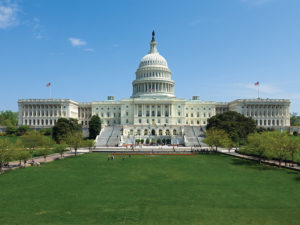
It is the beginning of the new year, a new congress has been sworn in and that, of course, means we need to start talking about presidential politics. Mostly because three candidates (Elizabeth Warren, John Delaney, Richard Ojeda at the time of writing this article) are already running, with many more on the way. Usually when we talk about the differences that Democratic candidates have with each other, it will likely follow the same predictable fashion by the media punditry: domestically they are far apart, and the stances will range from leftist to center left. To that I say, the overemphasis the media places on the similarities between these candidates takes away energy from the real divisions that may end up appearing within the party next year. The real difference may, in fact, lie in foreign policy, the area where the next president will have extensive control over and where the candidates will have more differences.
The first real division that may end up splitting the party in separate camps is the issue of trade. There are clearly two lines of thinking. One lane is occupied by Democrats like Sens. Michael Bennet of Colorado, or Joe Biden (D-Del.), who both have repeatedly advocated and pushed for free trade deals like the North American Free Trade Agreement (NAFTA), or the Trans-Pacific Partnership (TPP) with Asia more recently in 2015. However, perhaps inspired by the populist streak in our policy debates nowadays, there are candidates like Sens. Bernie Sanders (D-VT), Amy Klobuchar (D-MN), and Kamala Harris, (D-CA), who have shifted away from the conventional, bipartisan agreement on trade being an important unifying issue to bolster relations. Instead, all of these candidates at some point, either scrutinised the TPP, NAFTA or other previous trade deals. The candidate that will either contend free trade is here to stay, or there could be a continued shift away from that stance.
The biggest issue in foreign policy today is something that has been discussed heavily since the moment that Hillary Clinton won the Democratic nomination back in 2016: how to deal with Russia’s presence in the world, in light of the Mueller investigation, as well as the hacking incident that occurred on her email account. In this issue, the differences are delineated as clearly as possible: Sanders was one of the only senators who voted against the latest sanctions package in 2017, in response to the hacking allegations and election interference campaign, citing Iran as his reasoning for the position he took on the bill. He also voted against the Magnitsky Act of 2012, which tightened sanctions on Russia citing the provision that would normalize trade relations with Russia. Notably, former Texas Rep. Beto O’Rourke (D-TX) voted against a joint resolution in 2014 to condemn Russia for its actions in the illegal annexation of Crimea and the war in Ukraine. Lastly, Democratic Rep. Tulsi Gabbard (D-Honolulu) was the only member of the delegation of Hawaii to not voice the desire to see a special counsel be appointed as the result of the firing of FBI Director James Comey. All these varying actions do suggest real divisions, as nearly every other Democrat beyond those listed here has been much more vocal about being much more muscular in respect to Russia, from former Vice President Joe Biden to Kirsten Gillibrand (D-NY).
Finally, what will the Democratic Party do about our long-running combat in the Middle East going forward? According to independent analyses, the jury is still out on how the party wishes to orient itself, with a few key divisions on recent interventions. A good case study on this is the support of former President Barack Obama’s war in Libya. Sens. Klobuchar (D-MN), Kirsten Gillibrand (D-NY) and Bob Casey Jr. (D-PA) supported it back in 2011. That issue sees yet another split not easy to bridge as other candidates, such as Rep. Gabbard (D-Honolulu) and Sen. Sanders (D-VT) having had opposed such intervention in 2011. The voters who may go to caucuses may use that issue as a test in seeing what kind of candidate they want in terms of foreign policy in the Middle East as well.
Trade, Russia and our role in the Middle East appear on the radar for Democratic candidates seeking to differentiate themselves going forward in 2020. These critical international issues appear to be places where Democrats can truly differentiate themselves in an articulation of how they wish to interact in a fast-changing world.








